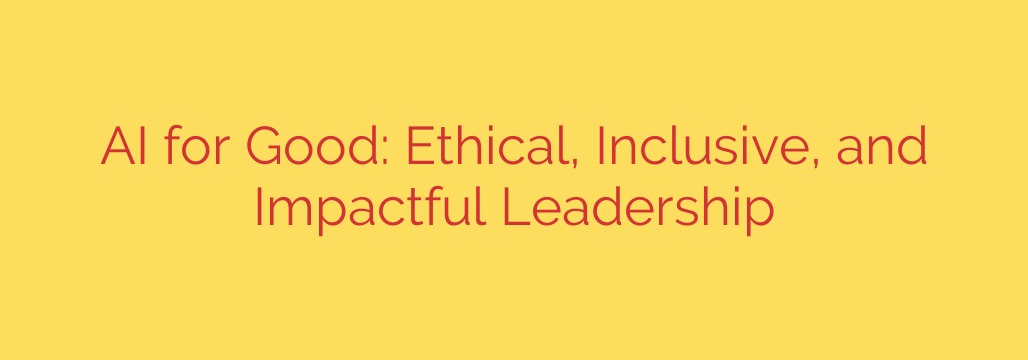
Leading the Charge: A Guide to Ethical, Inclusive, and Impactful AI
Artificial intelligence is no longer a futuristic concept; it’s a powerful force reshaping industries, economies, and societies today. As leaders, developers, and innovators, our focus must shift from simply asking what AI can do to defining how it should be done. Navigating this new frontier requires a new kind of leadership—one grounded in a deep commitment to creating AI that is ethical, inclusive, and genuinely impactful for humanity.
This isn’t just a feel-good initiative; it’s a strategic imperative. AI systems built without a strong ethical compass can perpetuate bias, erode trust, and create significant societal harm. True leadership in the age of AI means championing a vision where technology serves people, not the other way around.
The Foundation: Building AI on Ethical Principles
Ethics cannot be an afterthought in AI development. For an AI system to be considered “good,” it must be built on a bedrock of core ethical principles that guide its creation, deployment, and oversight.
The three pillars of ethical AI are transparency, accountability, and fairness.
- Transparency: Stakeholders and users should be able to understand, at an appropriate level, how an AI system makes its decisions. This “explainability” is crucial for debugging, identifying bias, and building trust. When an AI denies a loan application or makes a medical recommendation, there must be a way to understand the “why” behind its conclusion.
- Accountability: When an AI system causes harm, who is responsible? A clear framework for accountability is essential. This means establishing clear lines of responsibility within an organization, from the data scientists who train the models to the executives who approve their deployment.
- Fairness: AI models learn from data, and if that data reflects historical biases, the AI will learn and even amplify them. Actively working to mitigate bias is non-negotiable. This involves rigorous testing, diverse data sources, and ongoing monitoring to ensure AI systems treat all individuals and groups equitably.
Inclusivity: Ensuring AI Works for Everyone
An AI system is only as good as the data it’s trained on. If a development team lacks diversity and the data sets are homogenous, the resulting AI will inevitably fail to serve a diverse global population. Inclusivity is the key to building robust, universally beneficial AI.
The path to inclusive AI involves two critical components: diverse data sets and inclusive design teams. A facial recognition system trained primarily on one demographic will fail catastrophically when used on others. A voice assistant that only understands certain accents alienates millions of potential users.
To combat this, leaders must:
- Prioritize diversity in AI and data science teams. Different life experiences and perspectives are your greatest asset in spotting potential biases and blind spots.
- Invest in sourcing and cleaning data. Actively seek out data that represents a wide range of demographics, cultures, and contexts.
- Engage with diverse communities during the design and testing phases to gather real-world feedback.
From Theory to Reality: Creating Genuinely Impactful AI
The ultimate goal of “AI for Good” is to create tangible, positive change in the world. It’s not enough to simply build a technically impressive or profitable AI; its success must be measured by its ability to solve real-world problems and improve human lives.
Impactful AI is being used today to tackle some of our biggest challenges, from accelerating medical research and diagnosing diseases to optimizing energy grids for climate change and personalizing education for students.
To ensure your AI projects create meaningful impact, leaders should:
- Start with the problem, not the technology. Identify a genuine human need or societal challenge that AI is uniquely positioned to solve.
- Define success beyond profit. While financial viability is important, key performance indicators should also include metrics related to human well-being, equity, or environmental sustainability.
- Collaborate with domain experts. To solve problems in healthcare, you need doctors. To address climate change, you need climate scientists. Technologists cannot and should not work in a vacuum.
The Leader’s Playbook for Responsible AI
Fostering an environment where ethical, inclusive, and impactful AI can thrive is a top-down responsibility. It requires deliberate action and a steadfast commitment from leadership.
- Champion a Culture of Ethics: Make responsible AI a core value of your organization. Talk about it openly, reward ethical decision-making, and empower employees to raise concerns without fear of reprisal.
- Invest in Governance and Oversight: Establish an AI ethics board or review committee within your organization to vet projects, set policies, and ensure accountability.
- Demand Transparency: Don’t accept “black box” solutions. Insist that your teams can explain how their models work and can demonstrate that they have been tested for bias and fairness.
- Prioritize Long-Term Societal Value: Steer your organization’s AI strategy toward creating lasting value for customers and society, which is the most sustainable path to long-term business success.
The development of artificial intelligence is at a critical juncture. By embracing a leadership style defined by ethics, inclusivity, and a relentless focus on positive impact, we can ensure that we are building a future where AI empowers all of humanity.
Source: https://feedpress.me/link/23532/17113127/ai-for-good-leading-with-ethics-inclusion-and-impact








